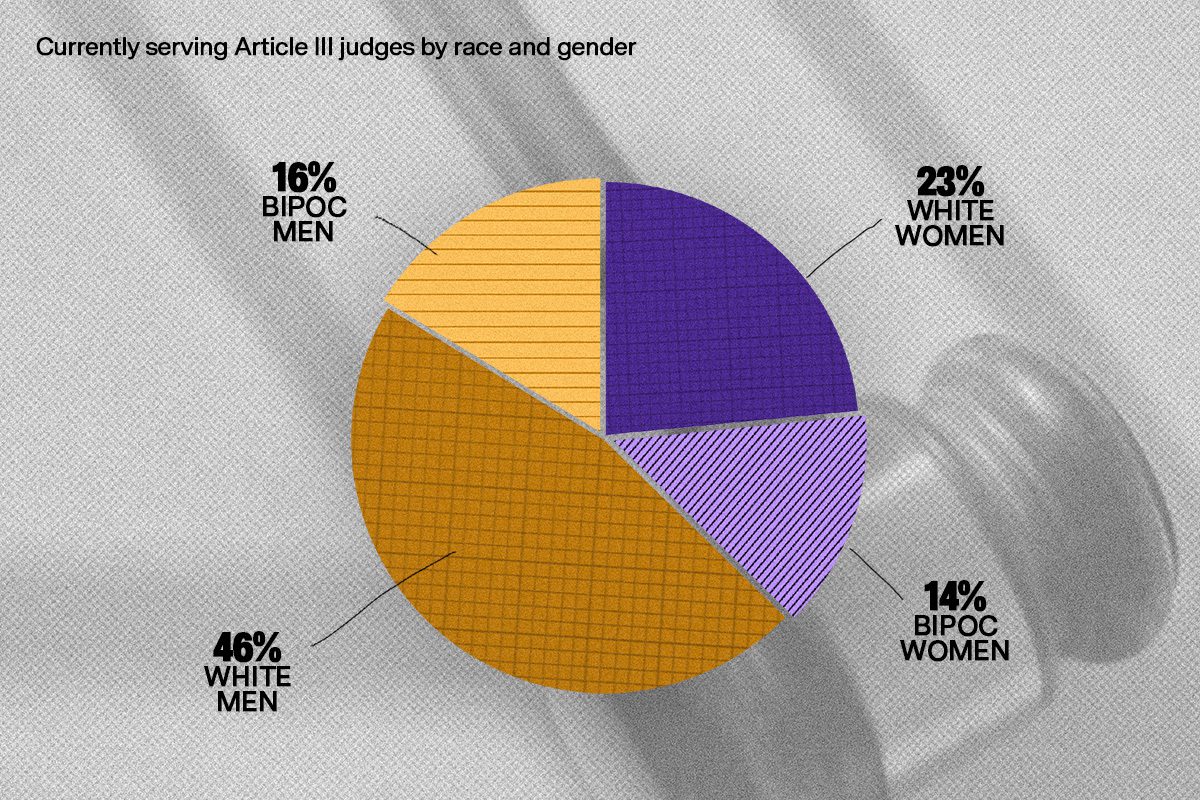We’re answering the “how” and “why” of politics news. Subscribe to our daily newsletter.
President Joe Biden entered the White House two years ago this month, bringing with him a promise to help diversify the nation’s highest court by nominating a Black woman.
He fulfilled that commitment in June when Justice Ketanji Brown Jackson became the first Black woman to sit on the U.S. Supreme Court. While Jackson’s historic confirmation was the most visible sign of systemic change in the judiciary, the president has prioritized diversity throughout the federal court system. Biden’s judicial appointees are the most diverse of any U.S. president to date in terms of race, gender and professional background.
Of the judges appointed by Biden in the past two years, 75 percent are women, 47 percent are women of color and 67 percent are people of color. This stands in stark contrast to his predecessor, former President Donald Trump, who two years into his presidency had appointed 85 judges, 92 percent of whom were White, 23 percent were women and 2 percent were women of color, according to analysis by The 19th. Biden has also prioritized nominating lawyers from professional backgrounds that are underrepresented in the federal judiciary.
The 19th took a closer look at how Biden’s administration is shaping the federal bench, as well as how his judicial appointments compare to former Presidents Trump and Barack Obama.
The data included throughout the article and graphics focus on full-time “Article III judges” who make up the U.S. Supreme Court, federal courts of appeals, federal district courts and the U.S. Court of International Trade.
The majority of Biden’s judicial appointees have been women and people of color. This includes Florence Pan, who in 2021 became the first Asian-American woman to serve as a federal district court judge in Washington, D.C. A year later, Pan was confirmed to the prestigious federal appellate court in D.C., the seat Jackson occupied before moving to the Supreme Court.
Two years into his presidency, Biden has appointed 97 federal judges compared with the 85 judges Trump had confirmed and the 62 judges confirmed under Obama by this point in their presidencies. But Trump’s role in shaping the federal judiciary was extensive. By the end of his only four-year term, he had 234 confirmed judges. Obama had 329 judges confirmed over eight years and former President George W. Bush had 328 judges confirmed during his eight years in office, according to figures from the Administrative Office of the U.S. Courts.
In August Biden had appointed more federal judges than any president since John F. Kennedy at this point in his presidency, but throughout 2022 Senate Democrats faced pressure from judicial advocacy groups like Alliance for Justice and Demand Justice to speed up the pace of his judicial confirmations for fear that his nominations would expire at the end of the year. A number of vacancies remain on the federal courts, which slows down their ability to move through the docket of cases, advocates said.
“That means that you’re not having our citizens get the justice that they need because of backlogs in courthouses,” Kimberly Humphrey, legal director for federal courts at Alliance for Justice, previously told The 19th.
The federal judiciary has historically been dominated by White men. Though the judiciary was established in 1789, the first progress toward a more diverse judiciary began in 1928, according to previous reporting from The 19th. A jump in diversity numbers among federal judges occurred in the 1970s under President Jimmy Carter, who increased the appointments of women and people of color to the bench.
Even with the added diversity under Presidents Obama and Biden, the largest demographic currently serving on the federal court system remains White men. Within the federal judiciary – about 800 judges active judges in total – 37 percent are women and about one-third are people of color. Over the years, some advocacy organizations have pushed to raise awareness about the importance of judicial confirmations and diversity within the federal bench.
Federal judges are involved in a range of both civil and criminal cases, and hear cases concerning the constitutionality of policies implemented around the country such as those that seek to restrict the rights of transgender people and access to abortion or birth control.
In addition to racial and gender diversity, Biden has also focused on professional diversity; the president has confirmed the most federal judges to appellate courts who have previously worked as public defenders.
“In the same way that our courts have been dominated by White men, they've been dominated by prosecutors and corporate lawyers who have spent their careers representing the government or the rich and the powerful,” Christopher Kang, cofounder and chief counsel of Demand Justice, told The 19th last year. “It's incredibly important to have lawyers who have experience sitting at the table with real life people and understanding their needs and defending their rights.”
Research indicates that judges with public defender backgrounds are less likely to give sentences that involve incarceration and may instead assign community service or probation. Former public defenders are more likely to give shorter sentences in cases when they do sentence people to incarceration, according to a 2022 paper from researchers at Yale and Harvard.
Even with the expanded diversity under Biden, his 97 judges represent just 12 percent of the total federal judiciary. Advocates for judicial diversity told The 19th they are hopeful that Biden will be able to match or surpass Trump’s number of judicial appointments and leave a strong legacy on the federal judiciary for years to come.
“There's certainly an opportunity for Biden to match Trump, but it's not a given that just because Democrats have control of the Senate that they're going to be able to take all of the judicial vacancies,” Kang said in November.
The number of Black women appointed during Biden’s first two years, particularly to federal appellate courts, has been significant. The federal appellate courts are the second-highest level under the Supreme Court and viewed as a stepping stone to a Supreme Court appointment. Prior to Biden’s presidency, eight Black women total had served on a federal appellate court. With 10 appointments of Black women to courts of appeals over the past two years, Biden more than doubled that number.
Black women not only face challenges breaking into coveted legal positions at every level of the industry, but those who do ultimately reach the level of being nominated to federal judge positions are also more likely to experience skepticism from senators about their political bias and past work experience, according to Dr. Taneisha Means, a professor of political science at Vassar College who spoke with The 19th last year.
Even with the credentials that accompany the Black women such as Jackson who are nominated to a federal judgeship, Means’ research indicates these nominees face longer delays by the Senate before they are confirmed and are seen as more partisan or radical than White nominees.
The public could see evidence of this in the framing of certain questions asked of Jackson during her Supreme Court confirmation hearings. At one point, Republican Sen. Ted Cruz of Texas asked Jackson if she believes babies can be racist.
As Jackson and other Black women continue to advance in judicial positions, they bring to the table their underrepresented perspectives and critical thinking about the law and the country’s institutions.
“We know from research that diverse groups bring about better outcomes because people bring a range of issues for the group to consider,” Angela C. Robinson, a retired Connecticut Superior Court Judge, told The 19th last year. “When you bring different life experiences, you can bring things to the dialogue that some people may not know.”




